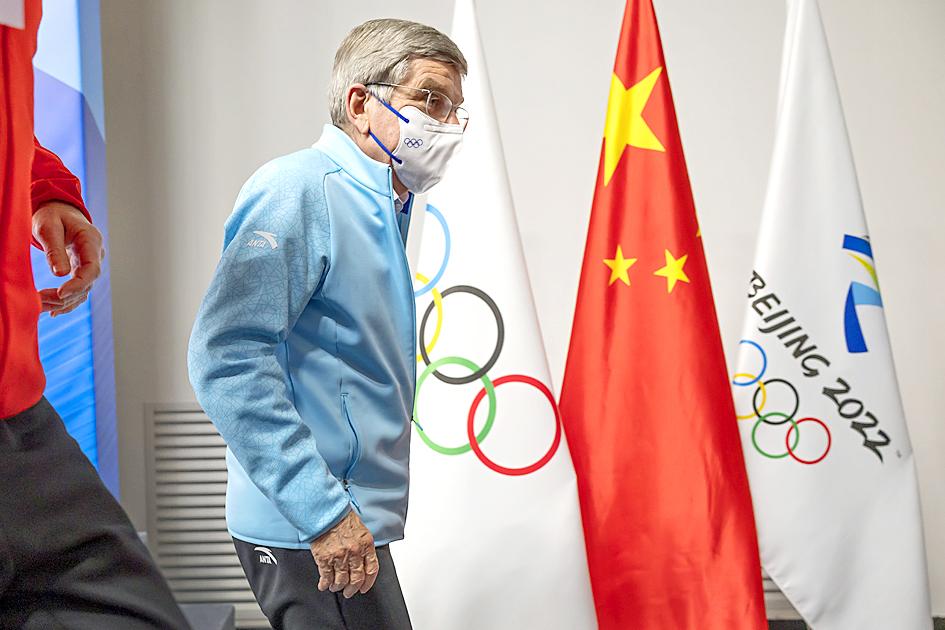The government on Friday rebuked China for using the Beijing Winter Olympics to assert its claims of sovereignty over Taiwan, saying that China had “cast a shadow” over the peaceful spirit of the event to spread propaganda.
Yan Jiarong (嚴家蓉), a spokeswoman for the Beijing Organizing Committee for the Olympic Games (BOCOG), on Thursday spoke of China’s position regarding Taiwan at a news conference attended by International Olympic Committee (IOC) spokesman Mark Adams.
“What I want to say is that there is only one China in the world. Taiwan is an inalienable part of China. This is a widely recognized principle of international relations and a consensus in international society,” the former UN envoy said.

Photo: EPA-EFE
Yan also responded similarly to questions concerning Xinjiang, calling reports about forced labor camps in the region “a lie” told by “some groups with malicious intentions.”
In Taipei, the Mainland Affairs Council on Friday said that “the people of Taiwan firmly oppose” Beijing’s “one China” principle.
“The Republic of China is a sovereign state, and Taiwan has never been part of the People’s Republic of China,” the council said, adding that it condemned China for interfering with international sports activities by asserting its politics.
The Ministry of Foreign Affairs also rejected Yan’s claims as untrue and said that the remarks “undermined the integrity of Taiwan’s sovereignty.”
The ministry also criticized China for spreading “inappropriate” political propaganda at the Olympics, saying that Beijing had breached the rule of political neutrality enshrined in the Olympic Charter.
“No kind of demonstration or political, religious or racial propaganda is permitted in any Olympic sites, venues or other areas,” the charter says.
Yan’s comments have also caused concern for IOC president Thomas Bach, who sidestepped questions about Xinjiang at the Games’ opening ceremony, citing political neutrality.
“We were in touch with BOCOG immediately after this press conference,” the New York Times cited Bach as saying on Thursday. “Both organizations, BOCOG and the IOC, have restated the unequivocal commitment to remain politically neutral, as it is required by the Olympic Charter.”
Yan’s remarks about Taiwan, which has four athletes at the Games, comes as China steps up efforts to limit the nation’s participation in international events and affairs.
The four athletes took part in the Games’ opening ceremony after the team said it had received “several notices” by the IOC urging them to attend the opening and closing ceremonies.
Last month, Taiwan initially said that its athletes would not attend due to delayed flights and China’s COVID-19 prevention measures.

CHAOS: Iranians took to the streets playing celebratory music after reports of Khamenei’s death on Saturday, while mourners also gathered in Tehran yesterday Iranian Supreme Leader Ayatollah Ali Khamenei was killed in a major attack on Iran launched by Israel and the US, throwing the future of the Islamic republic into doubt and raising the risk of regional instability. Iranian state television and the state-run IRNA news agency announced the 86-year-old’s death early yesterday. US President Donald Trump said it gave Iranians their “greatest chance” to “take back” their country. The announcements came after a joint US and Israeli aerial bombardment that targeted Iranian military and governmental sites. Trump said the “heavy and pinpoint bombing” would continue through the week or as long

TRUST: The KMT said it respected the US’ timing and considerations, and hoped it would continue to honor its commitments to helping Taiwan bolster its defenses and deterrence US President Donald Trump is delaying a multibillion-dollar arms sale to Taiwan to ensure his visit to Beijing is successful, a New York Times report said. The weapons sales package has stalled in the US Department of State, the report said, citing US officials it did not identify. The White House has told agencies not to push forward ahead of Trump’s meeting with Chinese President Xi Jinping (習近平), it said. The two last month held a phone call to discuss trade and geopolitical flashpoints ahead of the summit. Xi raised the Taiwan issue and urged the US to handle arms sales to

BIG SPENDERS: Foreign investors bought the most Taiwan equities since 2005, signaling confidence that an AI boom would continue to benefit chipmakers Taiwan Semiconductor Manufacturing Co’s (TSMC, 台積電) market capitalization swelled to US$2 trillion for the first time following a 4.25 percent rally in its American depositary receipts (ADR) overnight, putting the world’s biggest contract chipmaker sixth on the list of the world’s biggest companies by market capitalization, just behind Amazon.com Inc. The site CompaniesMarketcap.com ranked TSMC ahead of Saudi Aramco and Meta Platforms Inc. The Taiwanese company’s ADRs on Tuesday surged to US$385.75 on the New York Stock Exchange, as strong demand for artificial intelligence (AI) applications led to chip supply constraints and boost revenue growth to record-breaking levels. Each TSMC ADR represents

State-run CPC Corp, Taiwan (CPC, 台灣中油) yesterday said that it had confirmed on Saturday night with its liquefied natural gas (LNG) and crude oil suppliers that shipments are proceeding as scheduled and that domestic supplies remain unaffected. The CPC yesterday announced the gasoline and diesel prices will rise by NT$0.2 and NT$0.4 per liter, respectively, starting Monday, citing Middle East tensions and blizzards in the eastern United States. CPC also iterated it has been reducing the proportion of crude oil imports from the Middle East and diversifying its supply sources in the past few years in response to geopolitical risks, expanding